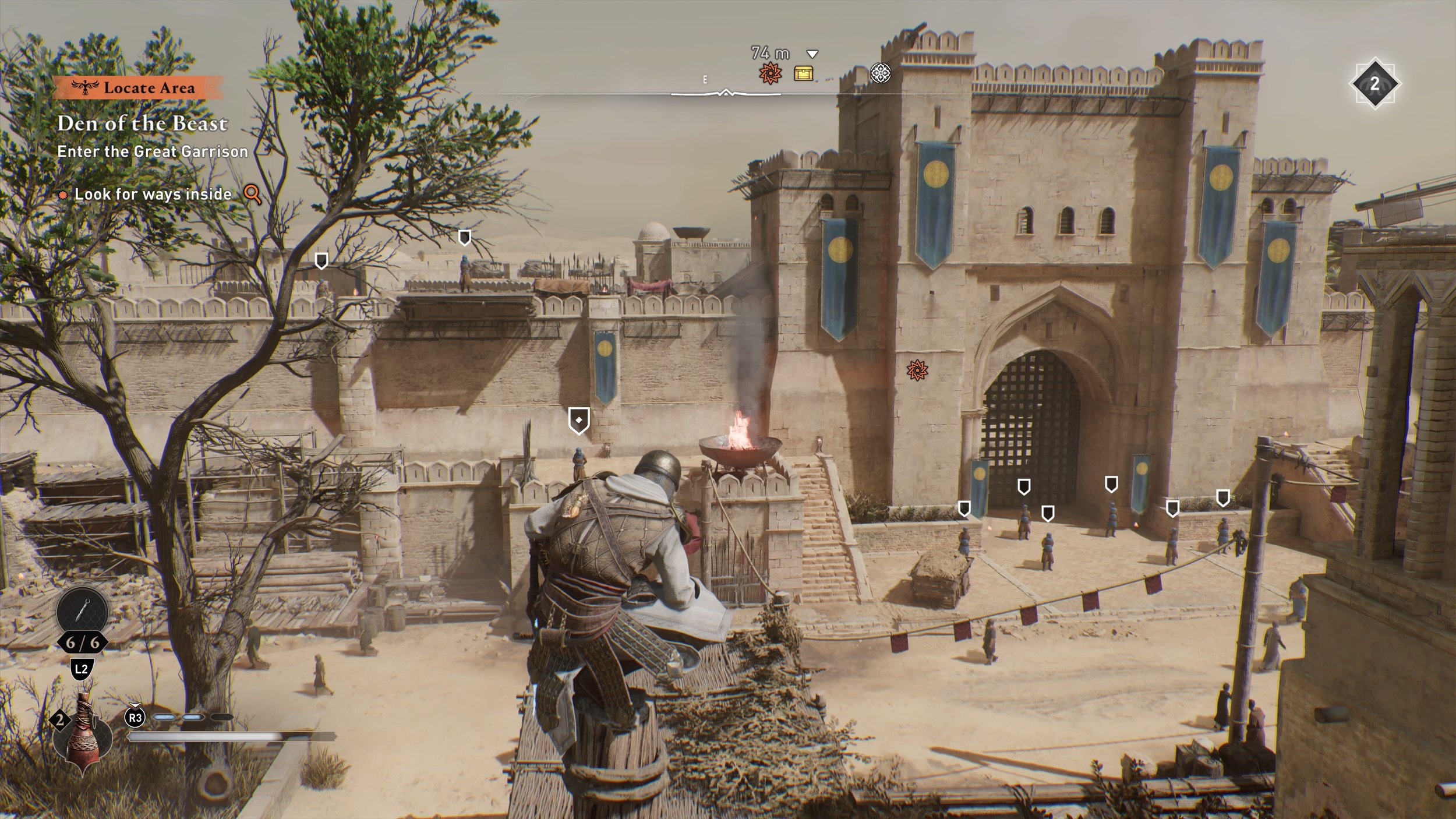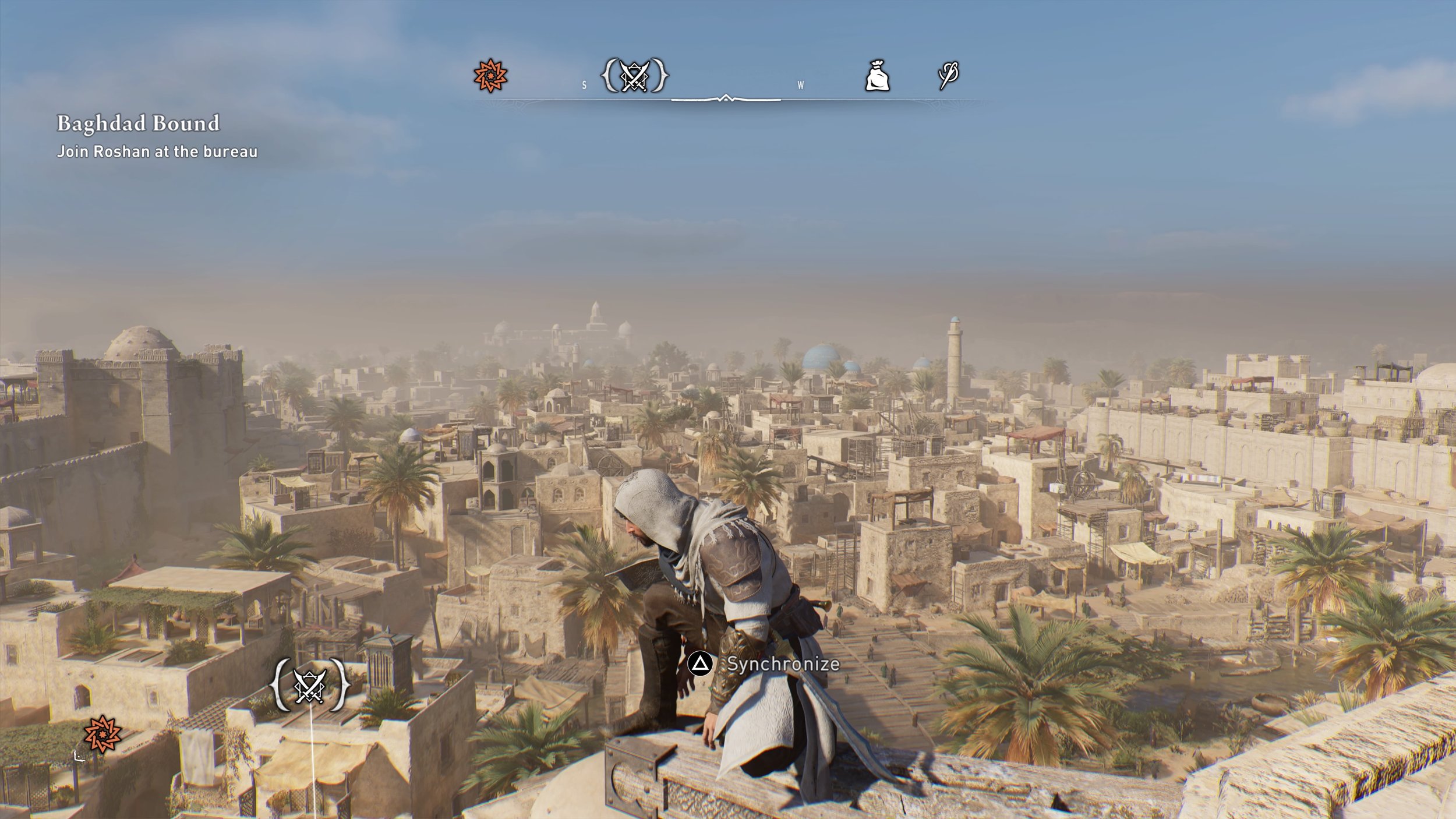Assassin’s Creed Mirage Review - Returning to the Core of the Creed
/Ubisoft’s latest entry in the long-running Assassin’s Creed series, Assassin’s Creed: Mirage, is the developer's way of re-embracing the series’ roots, before the shift into more action-RPG-oriented gameplay. In contrast to the large and ambitious Assassin’s Creed: Valhalla, Mirage is a pulling in of the reins a bit to re-align the franchise, and that restraint makes for a fantastic stealth-action-adventure that fans missing the good old days should thoroughly enjoy.
The Creed I remember
As I was navigating through the streets of 9th-century Baghdad, I felt how much I missed this kind of Assassin’s Creed - no loot-filled inventory to navigate through, no settlement to manage, nor any boats to improve or pilot. What I have is a skilled assassin at my disposal roaming the streets, slowly dismantling a secret organization, piece-by-piece.
You play as Basim, a street thief caught up in unfortunate circumstances that lead him to being trained and mentored by a group called the Hidden Ones, an early iteration of what we know from previous titles as the Brotherhood of Assassins. Just like past games, the story revolves around dismantling a group called the Order (also an early iteration of the Templars), slowly unveiling each key member of the group, who all hold positions of power in Baghdad. The story is pretty straightforward, with characters that can be shrugged off as a means to an end, as only Basim and his mentor make a lasting impression throughout this roughly 20-hour journey.
Basim is more of a boy scout than previous series protagonists, battling his personal demons while pushing to find the answers to the many mysteries that incentivize The Order to do what they do in the city. Picking apart the Order was easy enough to follow, but in true Assassin’s Creed fashion, everything goes off the rails towards the end, so only those well-versed in the overall narrative of the franchise – from each timeline to the involvement of modern-day characters – will truly appreciate the final moments. Once the credits started rolling, I had to refresh my memory from previous titles to piece things together, which was confusing but didn’t ruin my experience. Moreso, it rekindled my curiosity to have a basic idea of what is going on in this now-convoluted storyline Ubisoft started back in 2007.
Choose stealth, for your health and wealth
Thankfully, everything else about the game was pretty straightforward. Assassin’s Creed: Mirage is an action-adventure that made me feel like the team picked the brains of the creators of the first two titles, as the gameplay revolves heavily around stealth once again. The streets of Baghdad are bursting with life - citizens are going about their daily lives, with buildings and environments all perfectly crafted to make each street corner or rooftop a parkour artist’s favorite playground. Carts and crates are positioned just right for you to easily climb to reach the roof of a building, with ropes atop rooftops that connect from one building to another to serve as a means of crossing streets. Then there’s piles of hay everywhere, just waiting to safely catch any fool that dares to jump off a tall structure.
The level design of Assassin’s Creed has always been like this, but Ubisoft is never given enough props for how well they craft worlds full of these elements without them sticking out as being forced in. These implements blend seamlessly, as each area looks like just any other video game city, only this time the player can quickly climb every part of it by simply holding one button.
The parkour in Mirage is similar to the previous titles, as the player can freely navigate through the world with ease. There hasn’t been any issues with the climbing for multiple games now, and I strongly believe that Ubisoft have perfected that system to the point where any tinkering would hurt it. If it ain’t broken, leave it be. And that’s exactly what they did.
Stealth plays similarly on paper, but it’s given a lot more emphasis in Mirage thanks to the level and mission structure. The areas you need to infiltrate are more dense with enemies and roadblocks, making it rather difficult to navigate to your objective safely without proper recon and planning. There’s always something like a key you need to steal to go through a specific door, or opportunities to easily infiltrate compounds if you talk to the right NPC or abuse a certain situation. High bushes are perfect hiding spots for Basim, and his trusty hawk can be used as a scouting tool in the sky to mark enemies and key interests. You have all the tools to infiltrate these areas quietly as you slowly gain access to items like throwing daggers, smoke bombs, and sleep darts to dispose of enemies more easily.
Playing the game mostly via stealth felt just right, and perfectly captures why I enjoy playing these games in this manner. It’s not punishing like Hitman, but it also doesn’t make you feel like bursting through the front door to get it over with, as there’s nothing like entering a highly-fortified garrison, and then getting out without ever alarming anyone to your presence.
What level-ups?
When they spot you and it’s time to fight, it can be tough, as it never feels advantageous when you’re facing more than one enemy. The player will have to work with a stamina bar, a resource that allows you to do any action while in combat. Dodge, parry, or attack; any of these actions will drain your stamina bar, and when it's depleted, you can’t do any of them, leaving you exposed. Compared to Assassin’s Creed: Valhalla, combat is slow and methodical, as each swing has a weight to it that will leave you open for punishment if you miss. It’s not the most appealing combat system, but it greatly complements the game’s stealth elements.
Again, this isn’t an action-RPG, so there are no levels or experience to earn. Every successful mission in the main story gives you skill points that you can allot in either of the three main skill trees that don’t necessarily give you new ways to play but make you more proficient at either stealth, combat, or gathering information. These skills can be as simple as making you kick an opponent you just parried, increasing the range of marking enemies with your trusty hawk, or more absurd abilities such as being able to dissolve the body of any enemy you just killed with your throwing knife.
Gear is also simplified, as outfits and the two types of weapons Basim uses in combat will each have a single trait that can be improved through a blacksmith. It’s nothing too complicated, as we have stuff like dealing 50% more damage after a successful parry, or healing 1% of your health each second if you are below 50% of your total health. Nothing greatly overshadows one after the other, as each item comes as a preference rather than being a necessity to make a particular playstyle work. I sometimes even forget I have them.
Still has that Ubisoft touch
Outside stealthy infiltration and melee combat, Assassin’s Creed Mirage is still a Ubisoft-developed open-world game, filled with activities and side objectives that thankfully aren’t overwhelming but inviting this time around. I’m not overflowing with activities, but just enough to consider trailing off the main objectives for an hour or two. There are side stories, contracts, and collectibles all scattered around the city of Baghdad, and while on paper, they are your typical fodder, most of them turn out to be fun distractions.
Whenever I was engaged in Mirage’s side content, I’d find myself wondering, “How the hell do I get there?” Chests that contain gear are always tucked away so deep that a bit of thinking is needed, and puzzle-like scrolls called Enigmas have vague clues that serve as a treasure map of sorts and point to a reward hidden in plain sight. They even have collectibles that serve as bite-sized history lessons, giving you insight into the history of Baghdad, its culture at the time, and the key events that shaped the civilizations that lived in it. This kind of fodder is something I appreciated more than, for example, clearing different encampments that are designed exactly the same.
Going through the motions and doing these activities didn’t feel mundane. If you’ve played any Assassin’s Creed pre-Origins, you’ll feel right at home here, as you’ll enjoy overturning every stone in each section of the main city, slowly inching closer to fully completing everything this game has to offer. It has a nice flow with enough variety to keep any kind of monotony from taking form.
Once you pair this open-world game with a striking setting that, despite its mostly-brown color palette, is a visually-striking video game that shows that the game engine Ubisoft Anvil can still deliver impressive visuals in 2023. Small details really bring it home, from the sand effects when traveling through the terrain to the way sun rays bounce off fields and city streets. Sadly, I can’t say the same about the facial animations, as they sometimes seem a bit stiff in certain scenes. Assassin’s Creed Mirage is a gorgeous game that runs surprisingly well with barely any problems, technically or visually. The only issue I had was the enemy AI acting a bit awkward, which is more hilarious than frustrating.
In the end, there’s no clear concept or gimmick that sets Mirage from the rest. If Assassin’s Creed IV: Black Flag is known for its pirate theme and ship battles, and Assassin’s Creed Unity has its co-op features, Assassin’s Creed Syndicate with its dual protagonist, Assassin’s Creed Mirage has… nothing aside from the unique setting and the core elements that define an Assassin’s Creed game of the early days. If you were not keen on the games before Origins, it’s likely you’re thoughts on the series will not change with this one.
Assassin’s Creed Mirage is proof that the original, stealthy approach to the series’ formula still works just fine in 2023; Ubisoft’s commitment and focus on a single concept is a testament to its core strengths. Mirage lacks ambition, but it’s a welcome correction from recent bloated series entries. Trimming back to Assassin’s Creed’s roots from a gameplay perspective will be healthy for the franchise moving forward, as I consider this entry a realignment more than a reimagining.
Verdict: 4/5 (Fantastic)
*We’ve recently changed our review score format from a 10-score rating to a 5-score rating. You can check out the definition of the new review score system on our About Us page.
PROS
Assassin’s Creed stealth gameplay at its best
Fun open-world activities and a city that’s fun to navigate with parkour
Ubisoft Anvil game engine can still deliver visually stunning environments
Slower combat that complements its stealth elements
CONS
The story follows the same formula as previous titles and gets convoluted toward the end
Basim aside, this is not the best cast of characters
No unique trait/feature that sets the title apart from the rest of the series
What I’ve Played
Completed the main story at 18 hours
Did every kind of activity
Earned almost all skills in each tree
*This review is based on a PS5 code provided by the publisher











Assassin’s Creed Shadows greatly blends the classic Assassin’s Creed stealth with the RPG elements of recent entries. Its dynamic world, seasonal changes, and improved stealth mechanics make exploration a joy, but Yasuke’s restrictive gameplay, overall story, and a half-baked notoriety system hold it back.